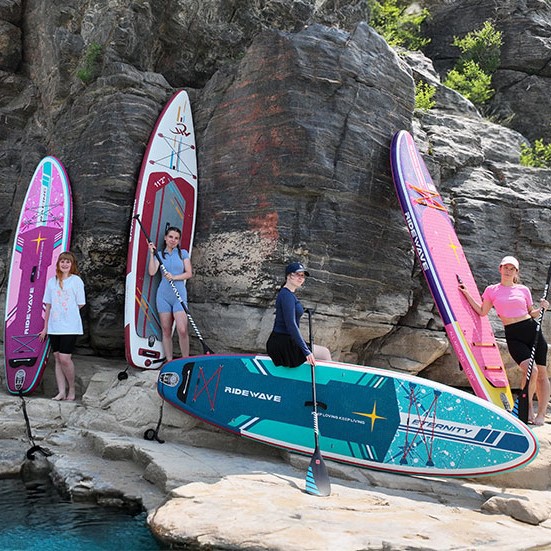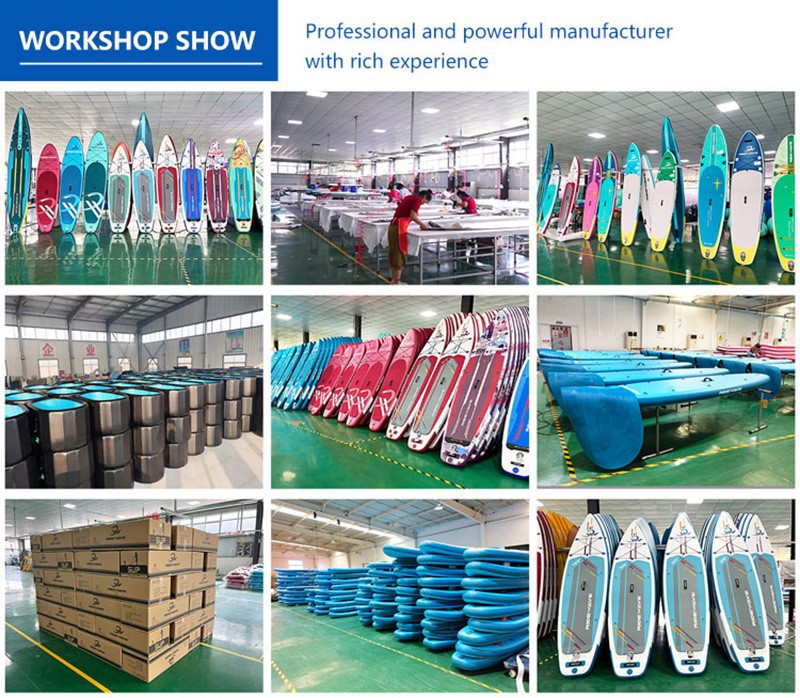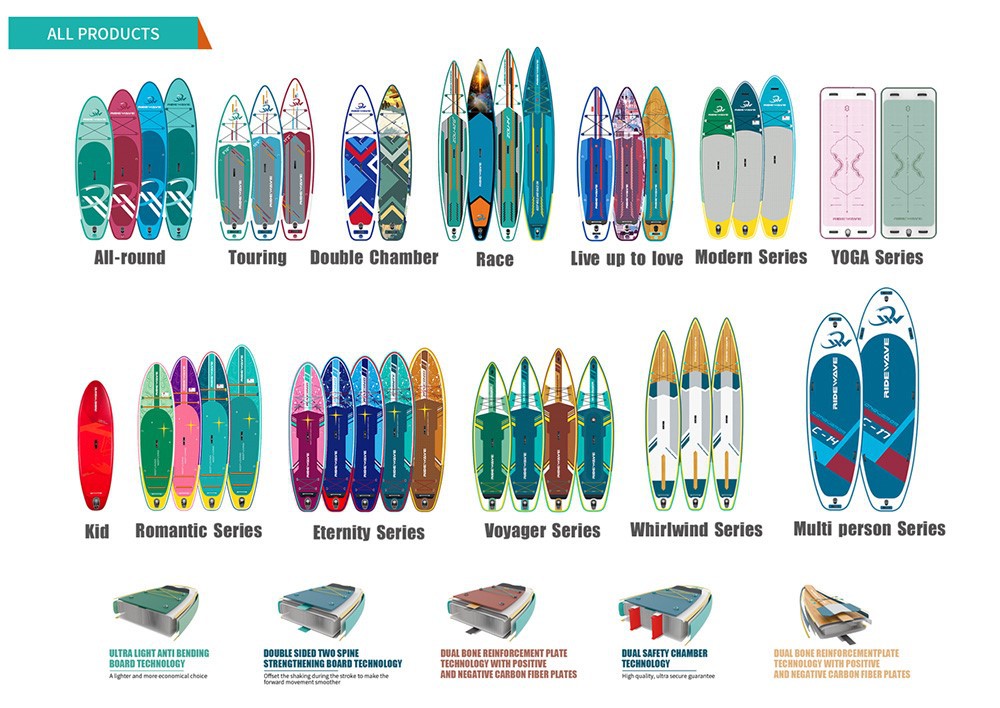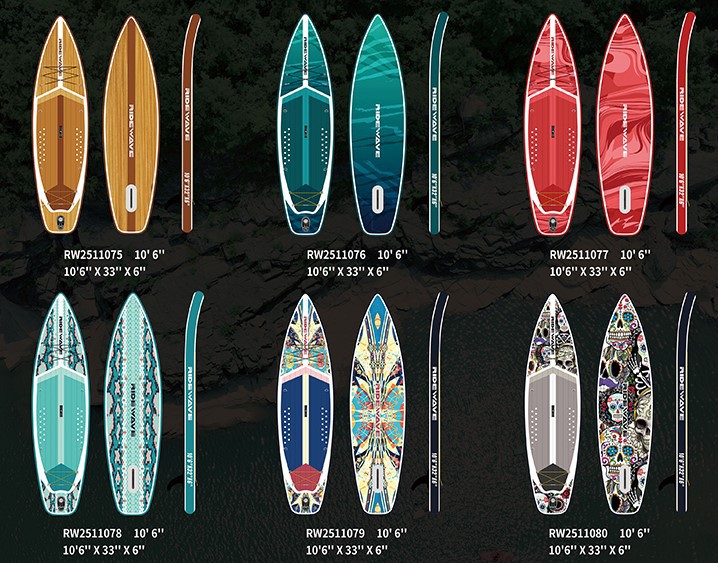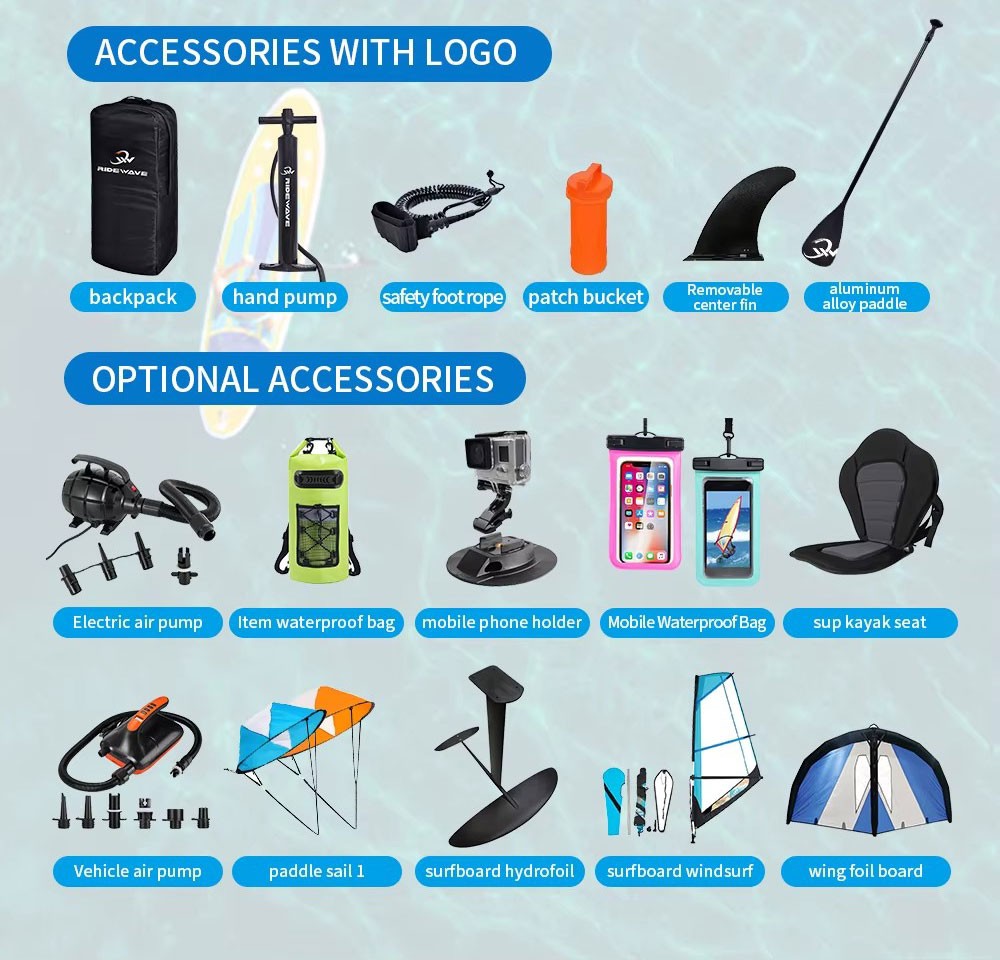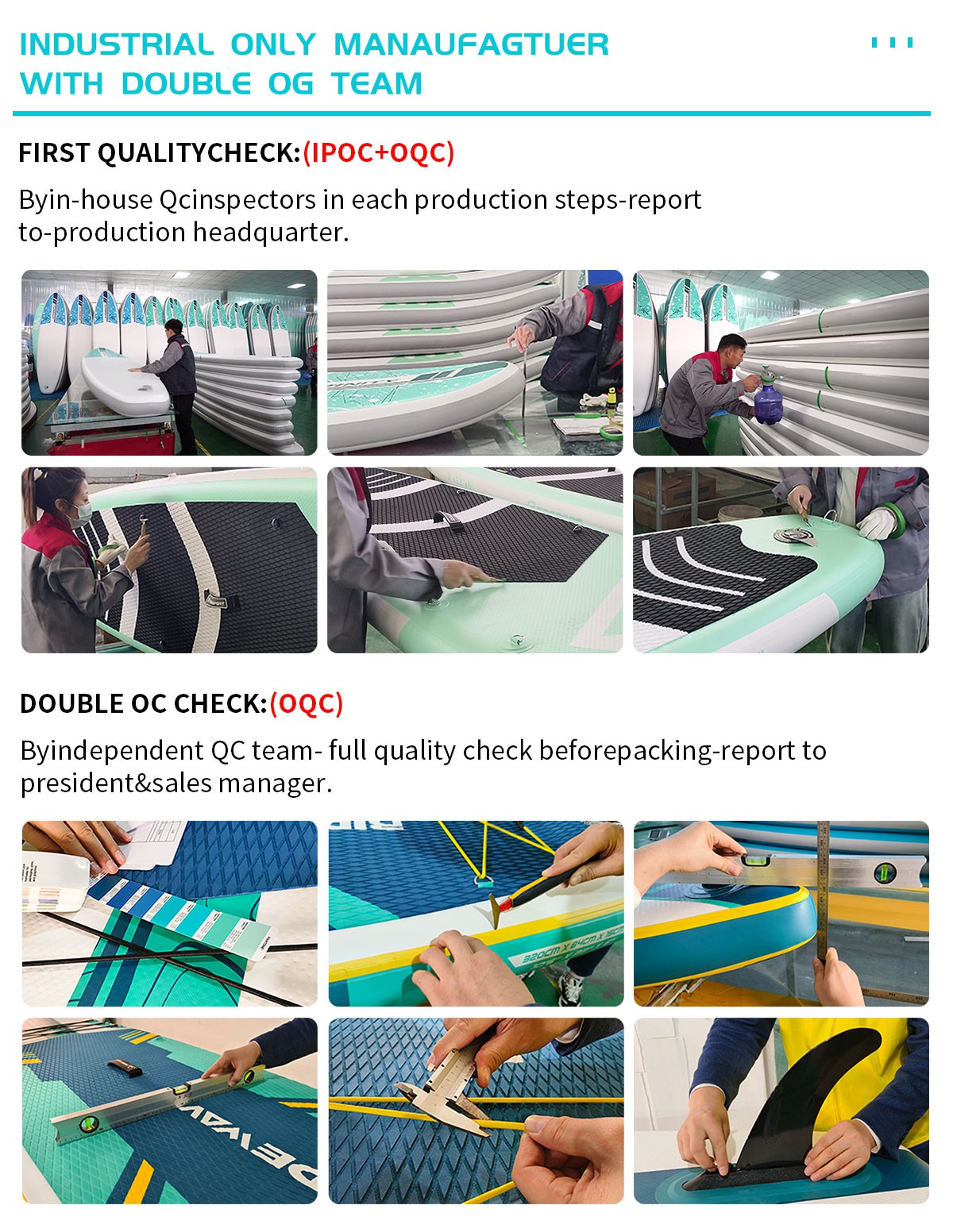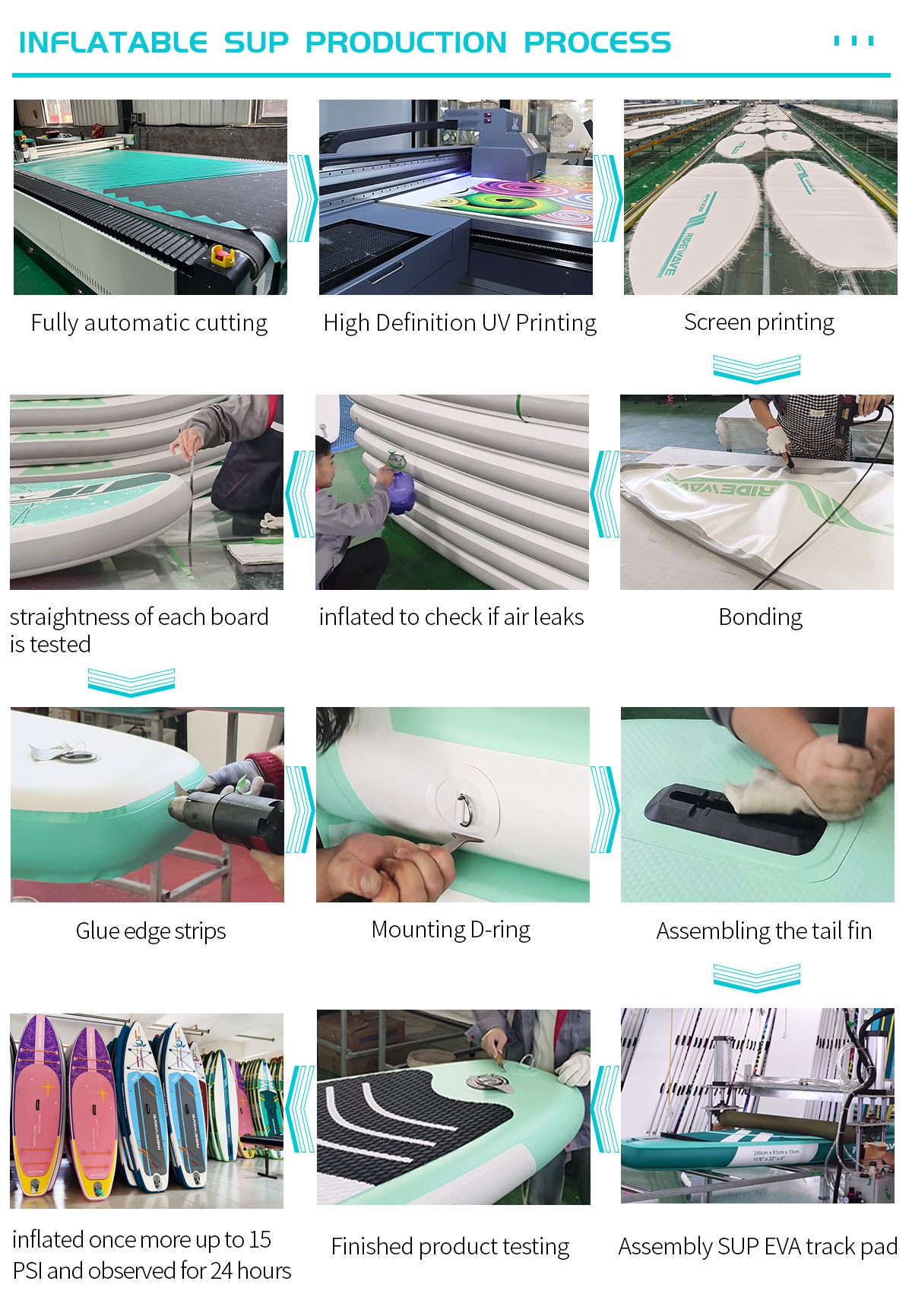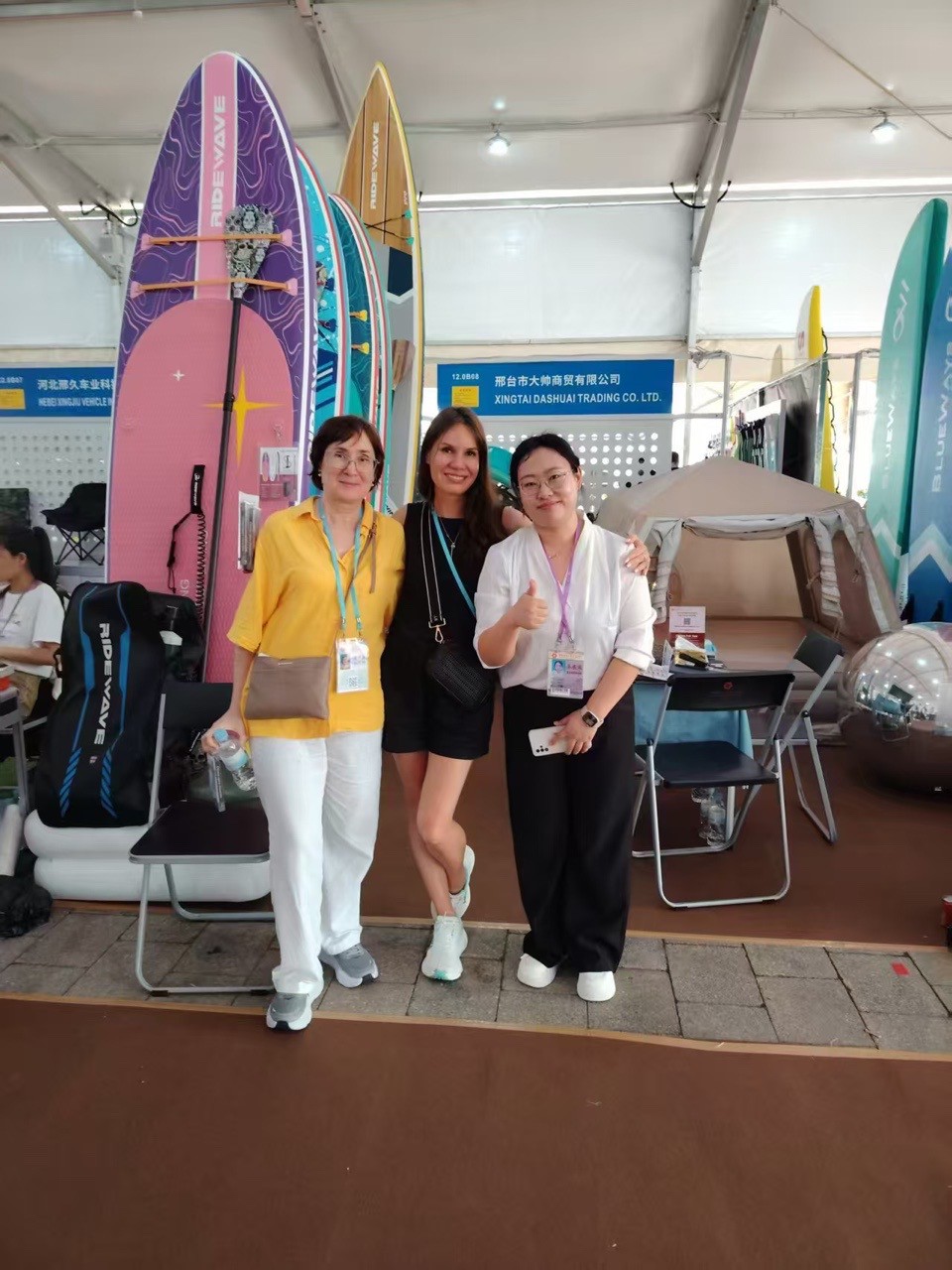How To Build A Private Label SUP Brand in 90 Days
Apr 30, 2025
Leave a message
The Stand-Up Paddle Board (SUP) industry has experienced remarkable growth over the past decade, and 2025 shows no signs of slowing down. In developed markets such as the United States, Canada, Australia, the UK, Germany, and France, SUPs are not just a summer hobby-they have become a year-round business opportunity. More consumers are seeking outdoor, water-based activities that are healthy, eco-friendly, and easy to learn. At the same time, retailers and distributors are looking for ways to stand out in an increasingly competitive sports and leisure market.
Private label SUP brands offer exactly that advantage. By putting your own logo, design, and packaging on a high-quality board made by an experienced manufacturer, you can create a unique product line without the cost and time required to build your own factory. Instead of spending years developing production expertise, you can focus on building a recognizable brand and selling products that already meet strict quality standards.
2025 is a special year for this opportunity. Consumer interest is at a peak, online sales channels are mature, and production technologies have improved to allow fast, small-batch manufacturing. With the right partner, launching a private label SUP brand in just 90 days is realistic. For B2B buyers, this means you can move faster than competitors, test the market without huge risk, and expand quickly if your first season performs well.
Ridewave, for example, has worked with many international distributors to launch new SUP brands within three months, offering everything from design customization to accessories and packaging solutions. By leveraging their experience, B2B buyers can avoid common delays and mistakes.
Defining Your SUP Brand Vision and Target Market
Before production begins, you need a clear vision for your SUP brand. This includes your brand's mission, values, and the type of experience you want your customers to have. Ask yourself:
Do you want to be known for high-performance racing SUPs or versatile all-around boards?
Will your brand focus on premium luxury models or affordable beginner packages?
Are you targeting retail stores, rental operators, or online marketplaces?
In developed countries, SUP buyers are increasingly diverse. Some want boards for ocean touring, others for yoga or fishing, and many for family recreation. The better you define your target market, the easier it is to design boards and accessories that meet their needs.
For example, if you target rental businesses, durability and easy repair may be more important than weight. If you focus on luxury buyers, unique graphics and top-end materials could be your selling points.
Ridewave offers market research support to help distributors match product lines to local demand. This ensures that you invest in models that will sell quickly and build your brand reputation from day one.
Choosing the Right SUP Manufacturer for Private Label Success
Your manufacturer is your most important partner. A good supplier will deliver high-quality boards, meet deadlines, and help with customization. A poor choice can lead to delays, defective products, and unhappy customers.
When choosing a SUP manufacturer for private label production, consider
Experience in the SUP industry – Years of production and a proven track record in developed markets.
Customization capabilities – Ability to adjust size, shape, colors, and graphics.
Low Minimum Order Quantities (MOQ) – Allows you to start small and scale up.
Quality control processes – 100% inspection before shipping.
Global shipping experience – Knowledge of export regulations and freight optimization.
Ridewave meets these criteria, with advanced production facilities, a 15-person QC team, and proven success delivering to Europe, North America, and Australia. They provide both OEM (your design) and ODM (ready-to-brand) solutions, giving B2B buyers flexibility in how they start their brand.
SUP Product Range Planning That Matches Your Market Needs
Planning your product range is critical for sales success. Your selection should reflect the preferences of your target customers and the conditions in your local waterways. Common SUP categories include:
All-around SUPs – Versatile boards for beginners and general use.
Touring SUPs – Longer boards for distance paddling.
Racing SUPs – Narrow, high-speed boards for competitive use.
Yoga SUPs – Wide, stable boards for fitness on water.
Fishing SUPs – Boards with mounts for gear and coolers.
For example, in Australia, touring and all-around models sell well due to coastal and inland waterways. In Germany, yoga and all-around models are popular for lakes and rivers. A balanced range often includes two or three core models plus seasonal or special-edition designs.
Ridewave helps clients design a balanced catalog, offering advice on which models are trending and how to test new styles without large investment.
Customizing SUP Design, Colors, and Branding Elements
Customization is the key to standing out in a competitive market. Your SUP's colors, patterns, and branding should instantly communicate your brand identity. Consider:
Color schemes that reflect your brand story
Unique deck pad textures and shapes
High-quality printed logos that withstand sun and saltwater
Limited-edition graphics for seasonal marketing
Ridewave offers advanced printing and material customization, allowing you to create bold designs without sacrificing durability. They also provide design mock-ups so you can visualize your product before production begins.
Selecting SUP Accessories That Boost Your Brand Value
When building a private label SUP brand, accessories are not just extras-they are part of your product's value proposition. A well-thought-out accessories package can make your brand stand out in the eyes of retailers, rental businesses, and end consumers.
Think about how a customer experiences your product from the moment they open the box. If they see a complete, matching kit inside, it immediately creates the impression of a premium, ready-to-use product. This is why many successful SUP brands offer boards with color-matched paddles, branded backpacks, and even co-branded safety gear.
Essential accessories to consider include:
Adjustable Paddle – Lightweight, durable, and adjustable to fit different users. Carbon fiber paddles are preferred by high-end customers, while aluminum paddles are affordable and strong.
High-Pressure Pump – A dual-action pump reduces inflation time and improves the customer experience. Electric pump options can be offered as a premium upsell.
Safety Leash – Coiled leashes prevent dragging in the water and increase safety.
Repair Kit – Includes patches, glue, and a valve wrench to extend the product lifespan.
Carry Bag or Backpack – Branded, heavy-duty backpacks make it easy to transport the SUP.
Optional Upgrades – Kayak seat attachments, waterproof phone cases, or fishing rod holders.
For B2B buyers, offering these accessories in a cohesive set with your brand colors and logo creates higher perceived value and allows you to command a higher retail price. Ridewave helps clients customize every accessory to match the board's design-paddle blades in the same color scheme, deck pad textures echoed in the backpack pattern, and logos positioned for maximum brand visibility.
In addition, accessories open up cross-selling opportunities. Retailers can sell replacement paddles, upgraded pumps, or additional leashes as add-ons. This generates recurring revenue and increases customer loyalty.
Ridewave's B2B partners often report that a well-designed accessories package can increase the wholesale price by 20–30% compared to selling the board alone, while keeping production costs manageable thanks to efficient bulk sourcing.
SUP Packaging Solutions That Make an Impact
Packaging is more than just protection during shipping-it's the first thing your buyer or end customer sees. A strong unboxing experience builds brand loyalty and creates a sense of professionalism. For B2B customers, professional packaging also reduces the risk of shipping damage, which directly affects your profit margins and customer satisfaction.
The right packaging balances three goals:
Protection – SUPs need strong outer boxes to withstand international shipping, especially for sea freight. Reinforced corners, waterproof wraps, and inner padding help prevent damage.
Branding – Printed boxes with your logo, color schemes, and marketing messages can act as a mobile billboard. Even in storage or transit, your brand is visible.
Sustainability – Many developed-market buyers prefer eco-friendly materials such as recyclable cardboard and biodegradable wraps.
Ridewave offers packaging solutions that integrate all three. For example, a North American distributor recently launched with Ridewave using fully printed, recyclable cartons with high-gloss images of the SUP in use. This not only protected the boards but also created an attractive display for retailers who stocked the products in their original boxes.
For rental companies or direct-to-consumer shipping, packaging can also include branded carry bags with extra padding and compartments for accessories. This doubles as a functional item the customer keeps, continuing to advertise your brand every time the SUP is transported.
Custom packaging is also a cost-effective marketing tool. When your packaging is photogenic, customers are more likely to share their unboxing experience on social media, giving you free exposure.
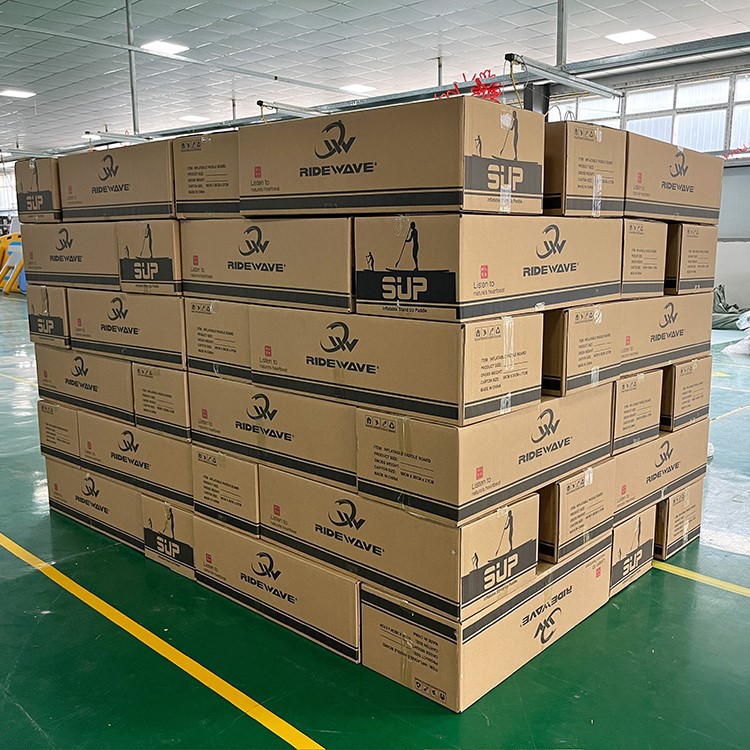
Quality Control for Private Label SUP Production
In the SUP industry, poor quality can destroy a brand's reputation quickly. Boards that lose air, have weak seams, or suffer from fading graphics will result in costly returns and negative reviews. This is why strict quality control (QC) is essential for private label brands.
Ridewave has developed a multi-stage QC system designed to ensure every board meets high international standards:
Material Inspection – Checking drop-stitch cores for density and consistency, confirming PVC thickness, and testing adhesive strength.
Pre-Assembly Checks – Ensuring printed graphics are aligned, deck pads are cut accurately, and accessory components meet specifications.
Seam & Valve Testing – Pressurizing boards to maximum PSI and monitoring for leaks over a set period.
Load & Performance Testing – Simulating real-world use to ensure stability and durability under weight.
Final Visual Inspection – Checking for scratches, discoloration, and packaging integrity.
For B2B buyers who can't visit the factory, Ridewave offers remote QC reports with photos, videos, and live video call inspections. This transparency builds trust and allows distributors to confirm quality before the shipment leaves the factory.
By investing in QC, you reduce the risk of warranty claims, improve customer satisfaction, and build a brand reputation that supports higher prices.
Managing SUP Production Timelines to Meet the 90-Day Goal
Launching a private label SUP brand in 90 days requires disciplined project management. Every step-from design approval to shipping-must be scheduled and monitored.
Here's a proven 90-day timeline used by many Ridewave clients:
Days 1–15: Design & Approval
Finalize your brand logo, colors, and board models.
Receive digital mock-ups from the manufacturer.
Approve designs and confirm specifications for boards and accessories.
Days 16–30: Sample Production & Testing
Manufacturer produces a pre-production sample.
Sample is shipped or shown via live video for review.
Adjustments are made based on feedback.
Days 31–75: Mass Production
Materials are ordered and cut.
Boards are assembled, printed, and sealed.
QC checks are performed throughout production.
Days 76–90: Final QC & Shipping
Final inspection and packaging.
Shipment arranged via sea or air freight.
Marketing campaigns launch ahead of product arrival.
Ridewave's efficiency comes from having in-house design, production, and QC teams under one roof. This eliminates delays caused by outsourcing steps to multiple suppliers. Many of their B2B customers have successfully launched before peak summer season by following this timeline.
Logistics and Shipping Strategies for SUP International Orders
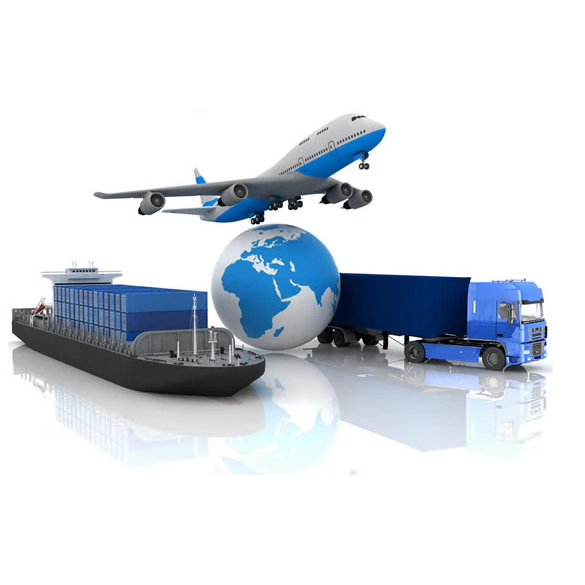
Shipping SUPs internationally is a complex task that affects both cost and delivery speed. B2B buyers must understand the options to avoid unnecessary expenses and delays.
Main shipping methods:
Sea Freight (FCL/LCL) – Best for bulk orders. Full Container Load (FCL) offers better rates, while Less than Container Load (LCL) is good for smaller batches. Transit time to North America or Europe is usually 25–40 days.
Air Freight – Faster (5–10 days) but significantly more expensive. Used for urgent orders or small premium shipments.
Rail Freight (for Europe) – An alternative to sea freight, taking about 15–20 days from China to Europe.
Ridewave has long-term partnerships with freight forwarders who specialize in sports equipment. This ensures boards are packed for maximum container space efficiency and that all customs documentation is correct.
Another key consideration is Incoterms-FOB, CIF, DDP, etc.-which determine who handles and pays for shipping, insurance, and customs. Many new B2B buyers underestimate the complexity of import regulations, especially in countries with strict safety certifications. Ridewave's logistics team can manage end-to-end delivery, including customs clearance, so you receive your shipment ready for distribution.
Building a Marketing Plan for Your Private Label SUP Brand
Even the best SUP won't sell without a clear marketing strategy. In developed markets, competition is strong, so your brand must stand out both online and offline.
Key marketing channels for SUP brands:
Social Media Marketing – Instagram, Facebook, and TikTok are ideal for showcasing lifestyle content. High-quality images and videos of your boards in use are essential.
Influencer Partnerships – Collaborate with water sports athletes, local SUP instructors, or adventure travel bloggers.
Retail Partnerships – Supply boards to established sporting goods stores and outdoor retailers.
Events & Demos – Organize demo days at lakes, beaches, or marinas where customers can try your boards.
Trade Shows – Attend water sports exhibitions to connect with wholesale buyers.
Ridewave supports its partners by providing product photography, detailed specs, and promotional materials. This helps B2B buyers launch campaigns immediately upon receiving stock, saving weeks of preparation time.
In addition, many distributors use pre-order campaigns to generate cash flow before the product arrives. By showing high-quality mock-ups and offering early-bird discounts, you can secure sales ahead of time.
Post-Launch Support and Scaling Your SUP Brand
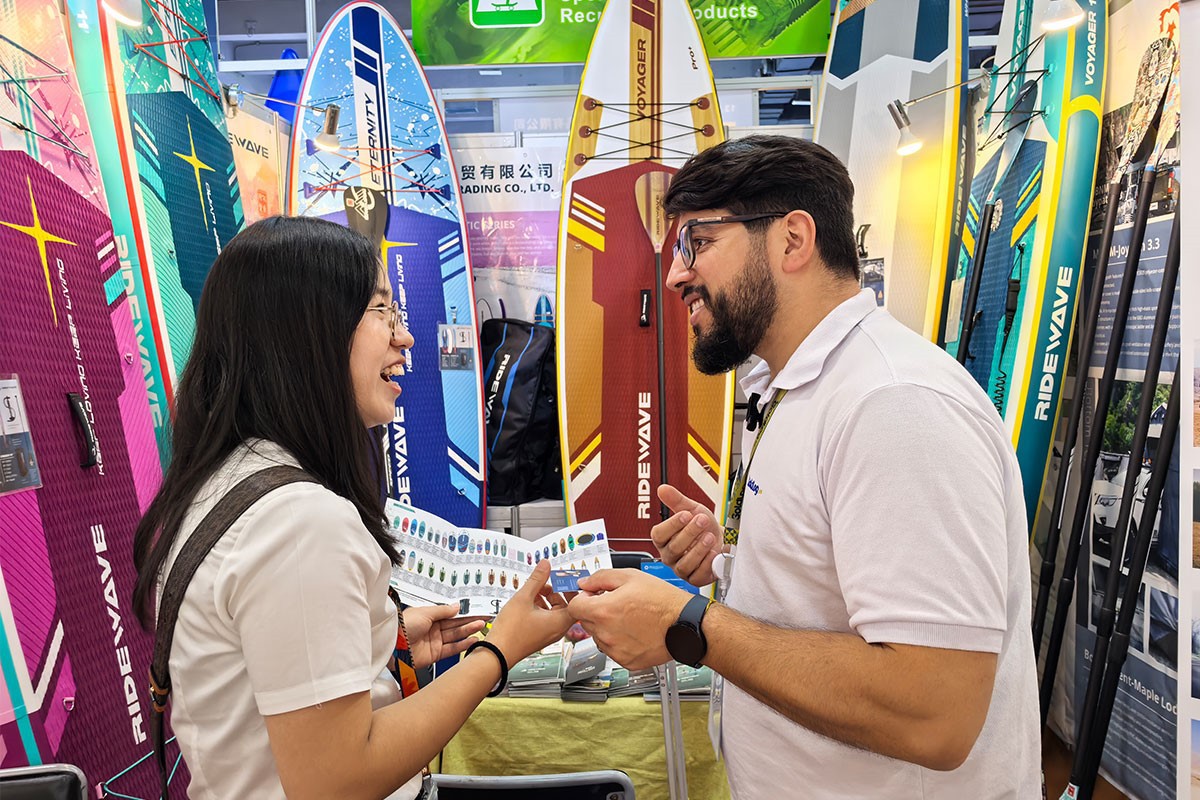
Launching is only the first step-true success comes from sustaining and growing your brand. After your first season, analyze sales data to see which models, colors, and accessories performed best. Use this information to refine your next order.
Post-launch support from your manufacturer is critical. Ridewave continues working with clients to develop new designs, introduce seasonal models, and manage inventory levels. They also help with after-sales service, including spare parts supply and warranty handling.
Scaling can take many forms:
Expanding your product line (e.g., adding inflatable kayaks or paddle board docks).
Entering new geographic markets.
Launching premium editions or limited-run designs for loyal customers.
For B2B buyers in developed countries, the ability to adapt quickly is a competitive advantage. Ridewave's flexible production model makes it possible to test new products in small batches, reducing risk while keeping your brand fresh and exciting.
In summary, building a private label SUP brand in 90 days is absolutely achievable with the right partner, clear planning, and disciplined execution. From choosing the right board design and accessories to managing production, quality control, and marketing, every step counts toward creating a strong, competitive presence in the market. With Ridewave's proven experience, B2B-focused services, and commitment to quality, you can launch on time, impress your customers, and start generating sales faster than you ever imagined.
Launching a private label SUP brand is just the beginning of your journey. To help you grow faster, avoid costly mistakes, and stay ahead of your competitors, we've prepared more in-depth articles that cover every stage of your SUP business. Here are some recommended reads:
1.Low MOQ, Fast Launch: Why B2B Brands Choose Ridewave to Get Started
– Learn how to launch your SUP brand with minimal investment while keeping professional quality.
2.Common Mistakes to Avoid When Importing Paddle Boards from China
– A must-read for first-time importers to prevent costly errors in production and shipping.
3.Why More Paddle Board Distributors Are Choosing Ridewave in 2025
– See why leading distributors in North America and Europe are switching to Ridewave.
4.How to Build a Paddle Board Brand: The Ultimate B2B Success Roadmap
– A comprehensive blueprint for building a long-term SUP business.
5.2025's Most Sought-After SUP Accessories Among European Distributors
– Find out which accessories create the highest profit margins for B2B suppliers.


